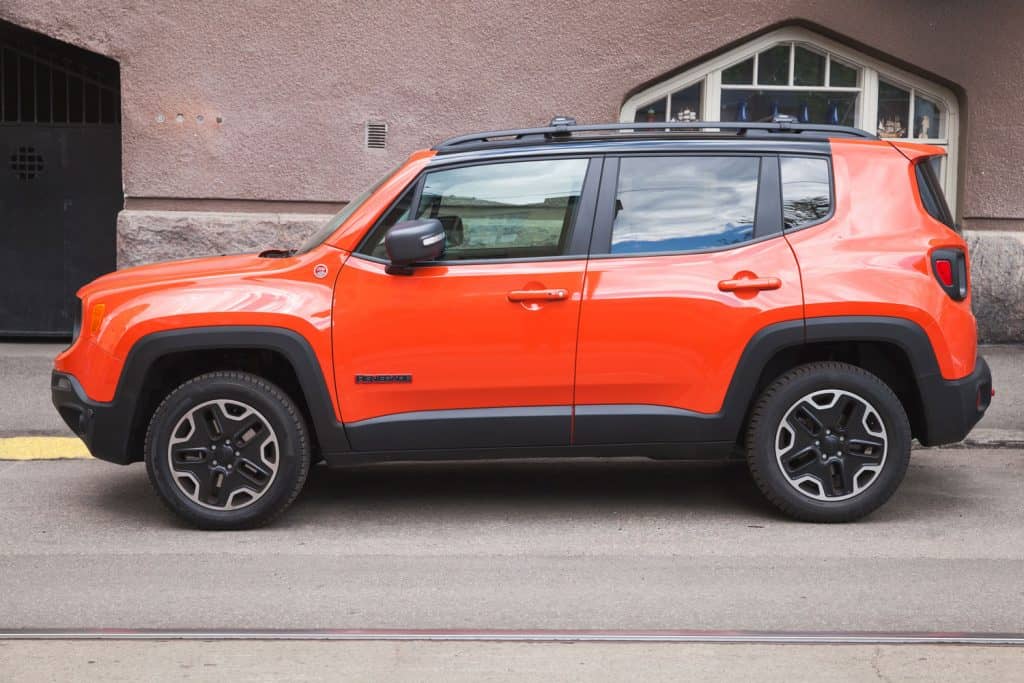It can be more than a little frustrating when you need to get to a destination and discover your Jeep Renegade is not accelerating. You may wonder what could possibly be wrong with your vehicle, provided the gas tank isn't empty. We researched some key problems that cause a Jeep Renegade to fail to accelerate. Learn more about the signs and symptoms your vehicle might be dealing with, and when it's time to take your car in for service.
If you are stepping on the gas pedal and your Jeep Renegade is not accelerating, consider the following issues that may be to blame:
- Bad Transmission
- Clogged Catalytic Converter
- Bad Clutch
- Disconnected Drivetrain
- The Fuel Filter
- Timing Belt Problems
- Torque Converter Gone Bad
- Transmission Fluid Is Low
- The Vacuum Has A Leak
Don't panic. Keep reading to discover how to fix these common problems that cause a Jeep Renegade to not accelerate.

Troubleshooting Acceleration Problems
Your car is a large part of your life and a significant investment, so when you discover problems with acceleration, it's troubleshooting time. Sometimes the RPM needle will be moving and stall out at a certain point, and other times that needle won't budge. Could it be that something is clogged, disconnected, or needs outright replacing?
After a little inspection, you can probably deduce the likely problem that is slowing you down or causing your car to not move at all. However, it is best to take your car in to a certified dealer or professional mechanic to be sure. Learn about common problems that cause a Jeep Renegade to not accelerate and what can be done to solve each problem.
1. Bad Transmission
The Jeep Renegade has only been in production since 2014, and has encountered software problems in its past. Programming problems with the first line of Jeep Renegades caused malfunctions with its 9-speed automatic gearbox.
If the transmission is acting up, chances are you might be experiencing challenges with acceleration. If software isn't the problem, make sure that the level of transmission fluid isn't low, or the transmission doesn't need outright replacing.
2. Clogged Catalytic Converter
You might want to take a look at your catalytic converter if you notice sluggish acceleration, a poor running engine, the smell of sulfur, and excessive heat under the hood. If you step on the gas and your Jeep Renegade moves like a turtle instead of roaring like a lion, a choked catalytic converter may be the culprit.
Try using a cleaner for your engine, catalytic converter, and fuel system. If this doesn't work, take your car in to check for loose, damaged parts, and remove buildup.
Read more: How To Use A Fuel Injector Cleaner
3. Bad Clutch
Do you love driving stick? Well, if your Jeep Renegade is outfitted with a clutch for manual transmission, that pedal could be too loose or worn out. If the clutch is bad, it is unable to engage the transmission and the engine, and you will not be accelerating anywhere anytime soon. You could also experience changes in speed when you don't want your Jeep to accelerate or decelerate.
4. Disconnected Drivetrain
If you were wondering why the Jeep Renegade might be struggling with a less than stellar reliability rating, the hitch isn't the only thing that could disconnect. Poor acceleration may be caused by a disconnected drivetrain.
You may notice that your vehicle is hesitating when you try to accelerate. The Jeep may vibrate, buckle, make loud noises, drip transmission fluid, or give you problems when turning. Take your vehicle in for service and pay attention to malfunction lights.
5. The Fuel Filter
For your Jeep Renegade to accelerate without a hitch, your engine should have no problems getting fuel. However, if the fuel filter has gone bad or is seriously clogged, you might notice poor acceleration. A vehicle will be difficult to start, let alone accelerate if the fuel filter has reduced flow, causing the fuel pump to work even harder. If the engine has reduced power, acceleration is going to be reduced too.
Check out this fuel injector cleaner on Amazon.
6. Timing Belt Problems
If the timing belt in your Jeep Renegade is an issue, leave a repair or replacement up to a certified, professional mechanic. A slipped belt can cause rough idling, misfires, or even taping noises from the engine. If the belt is very worn, you may experience reduced acceleration, reduced power, and the check engine light will be on.
7. Torque Converter Gone Bad
When a Jeep Renegade is having poor acceleration, the torque converter might be the problem. The torque converter sends energy from the engine to the transmission, and may be going bad if you notice vibration or a higher RPM when on the expressway.
Issues with the transmission fluid, bad clutch, poor seals, or loose bolts can all cause the torque converter to go bad. Lookout for a slipping transmission, reduced speed, strange sounds, and shuddering.
8. Transmission Fluid Is Low
It is essential that the transmission has enough fluid to keep it from overheating and suffering problems. Aside from experiencing reduced acceleration, you may notice flippant shifting with your vehicle, a burning smell, smoke, and a loss of power if the fluid levels are too low.
Enough transmission fluid is needed to ensure smooth shifting and good timing as you drive. Don't risk driving with a transmission with low fluid levels which could lead to slipped gears, overheating, and failure.
Check out this transmission fluid on Amazon.
9. The Vacuum Has A Leak
The vacuum needs to be in top shape in order for the engine to properly combust fuel and deliver power to the vehicle. If there is a leak in the vacuum, you may experience poor acceleration and reduced engine power. Leaks lead to a whistling sound, reduced force, and possible hesitation with your vehicle. Also, the check engine light might pop up and you might have sporadic idling.
Why Does My Jeep Hesitate When I Accelerate?
The fuel injector and fuel pump become absolutely filthy and clogged over time. It is a smart decision to apply a cleaner to dislodge debris and keep essential parts of your vehicle running smoothly. If the engine cannot get a smooth delivery of fuel, a car can hesitate when you try to accelerate. A weak, dirty fuel pump and fuel injector, or even a malfunction with computer sensors can cause hesitation.
Can Bad Spark Plugs Cause Hesitation?
If you notice that your car hesitates, experiences rough starts, or there is poor acceleration, these are all signs of a bad spark plug. Replace your spark plugs if you have misfires when you attempt to accelerate or poor fuel economy. Don't put off replacing bad spark plugs as it can severely impact engine performance and cause damage.
Check out these spark plugs on Amazon.
What Causes Sluggish Acceleration?
Sluggish acceleration can occur because of a dirty, clogged fuel filter, a malfunctioning sensor, or even a bad spark plug or fuel pump. If you cannot determine the exact cause of sluggish acceleration, take your car in for service. It unwise to continue driving a car that cannot properly accelerate and decelerate as needed.
Do Jeep Renegades Have Transmission Problems?
There have been past problems with the Jeep Renegade displaying transmission problems because of software issues. However, newer models of this line, stretching back to 2014, have worked out most of the concerns with the transmission. There have been documented problems regarding the Renegade with lurching, shifting into neutral, wiring concerns, and hard shifts with turns.
Can Low Oil Cause Slow Acceleration?
Your vehicle's engine relies on being a fine-tuned, well-oiled piece of equipment to be a powerhouse. If the engine could stand some lubrication because it has become dirty, clogged, and needs service, lookout for slowed acceleration to follow. A lubricated engine that receives regular oil changes will perform better and not idling roughly with sluggish acceleration. Make sure the oil levels are not low.

In Closing
We hope you feel more confident about different problems that can impede the acceleration of a Jeep Renegade. Thankfully, many of these issues have a solution and can be fixed. If you don't feel comfortable executing the repairs yourself, take your car to a certified Jeep dealer or a reputable professional for services. Driving a vehicle that has problems with acceleration can be dangerous and should be remedied as soon as possible.
Before you go, don't miss out on the following helpful articles that may be of interest:



